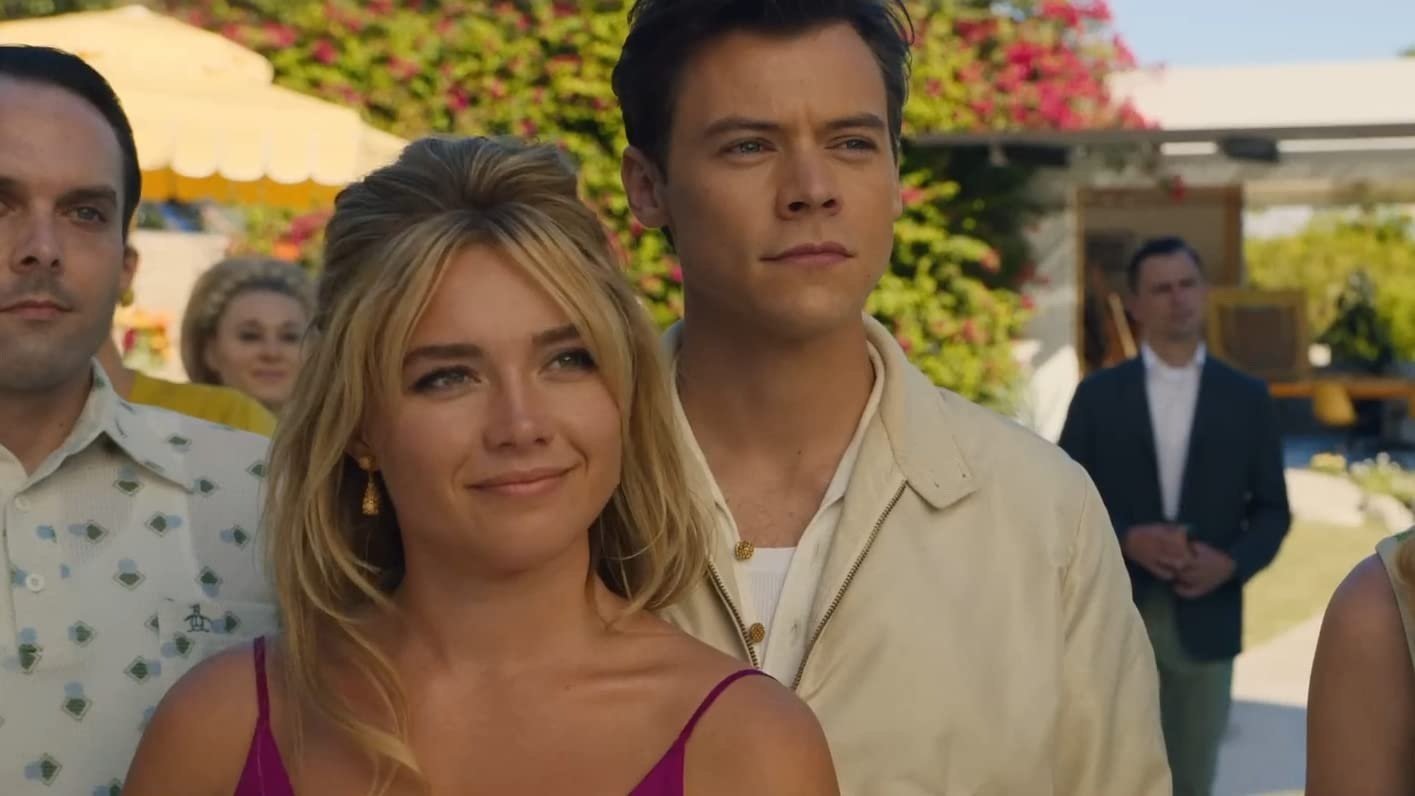‘Don’t Worry Darling’ Review: If Olivia Wilde Set Her Bar Lower, She Might Have Been Able To Meet It
Depending on the person, there are many different ways to evaluate the success of a movie. Budget size, all-star cast, exciting original script… Perhaps a combination of many things. My criteria, however, has remained quite static — singular, in fact. A film is successful if it is entertaining. Despite all it’s flaws — and there are many — ‘Don’t Worry Darling’ was an aesthetically-pleasing, beautifully designed, and overall entertaining film.
The first 25-minutes of the film are an immersive tour into the idyllic 1950s Palm Springs neighborhood called ‘The Victory Project.’ It’s a suburban fantasyland with beautiful front lawns, living rooms filled with practically untouched art-deco furniture, and men and women dressed in crisp suits and vibrant full-skirt dresses. We understand that something darker looms under ‘The Victory Project;’ however, I couldn’t help but find myself deeply seduced by the place. While it’s nowhere close to being ingenuitive, the aesthetic world-building of the neighborhood was a triumphant melange of set design, ominous diegetic sound, a cracking score, and glamorous sweeping shots of the cul-de-sac.
The irony is not lost on me that the film’s structure sloppily unravels as Wilde starts weaving in sci-fi thriller elements into her sci-fi thriller film. It was evident that her directing in this genre came from mimicry rather than a subtle influence. She repeatedly returned to juvenile insert shots (i.e. the eggs and bacon cooking on a skillet) and visual motifs of blood and black and white ballet dancers that are at once irrelevant and cinematically hackneyed.
Not to mention, every one of these cut-aways were layered over John Powell’s excellent and hypnotically eerie score which was more “thrilling” than any visual or narrative aspect of the film. It felt like a mix of the best of Atticus Ross and Trent Reznor’s turbulent synthetic strings and Hans Zimmer’s ‘Dune’-like choral singing. Brilliant. Placing Wilde’s imagery on top of such a great score was, in turn, relying too heavily on the music for an emotional reaction.
Plainly, Wilde was out of her depth in tackling a film like this (and it’s not like she made it any easier on herself). Throughout the film’s press tour, Wilde cited pretty iconic films like ‘Inception’ and ‘The Matrix’ as inspiration and filmic comparisons. This would be completely reasonable if she had the experience and talent to take on what is one of the most difficult genres to direct, a sci-fi thriller. However, entering a genre like this while, perhaps accidentally, comparing her work to that of generational masterpieces creates an unobtainable bar as well as a distasteful egoism that sets viewers up for disappointment.
Festival Blowback
Honestly, after comparing the pre and post theatrical release reviews, no group was more disappointed with the film than the critics at the Venice Film Festival. That being said, it would be wrong to claim that they were unfair in their criticism. There is a certain level of filmmaking that is expected at the Venice Film Festival. Previous Golden Lion winners include multiple Best Picture Oscar winners and nominees, practically all of the Young Turks of the French New Wave, and filmmaking icons such as Buñuel, Antonioni, and Altman. Say what you want about whether you like these filmmakers or not, but its pretty undisputed that the films selected to screen at the Venice Film Festival require filmmaking of the highest narrative and technical caliber.
Did ‘Don’t Worry Darling’ premiering at Venice hurt the film’s initial perception? I have to wonder that if it went straight to its theatrical release it could have avoided comparisons to other Golden Lion contenders of an exceptional filmmaking cadre. Instead, it could be reviewed in isolation as what it is: a flawed but highly-stylized topical thriller.
Festival Blowback Olivia Wilde Is Not an Actor’s Director
I think the talents needed in a great film director as two-fold: directing production and performance. Olivia Wilde achieved a lot of the former. She folded together amazing set design, sound and score, and a couple of very entertaining camera shots to create some impressive world-building. However, the second-half of her job — getting the best performance out of her actors — was much less successful.
It’s no secret that ‘Don’t Worry Darling’ is stacked with a star-studded cast— the film stars the current Princess of Hollywood, Florence Pugh, and the so-called “King of Pop”, Harry Styles, accompanied by a swath of critically acclaimed veteran talent in Chris Pine, Gemma Chan, and Nick Kroll. So, Olivia Wilde was very lucky in that her flaw of not being an actor’s director wasn’t greatly exposed — except when it came to Harry Styles.
In a film with many comedic one-liners, nothing was more laughable than Styles’ performance. His most emotional and punchy scenes felt limp and inexperienced. It was as if a kid got his first leading role in a middle school play and only associated the emotion of anger with furrowed brows and unnecessary yelling. His on-screen chemistry with Florence Pugh is only held up by her performance as he is absolutely devoid of emotion in all of their scenes.
While this might seem overcritical, it is only because he is actually capable of more as an actor. His role in ‘Dunkirk,’ while small, was excellent and I’ve heard his performance in the upcoming drama ‘My Policeman’ wasn’t too bad either. It is up to the director as much as the actor to give the notes and critiques necessary to improve a performance.
In the end, the fact that we’re talking about ‘Don’t Worry Darling’ means it is a success in breaking through a crowded breadth of media. While we should maybe hold-off on giving Olivia Wilde an Oscar, it’s exciting to see an actress-turned-filmmaker get the chance to make a high-budget, genre blockbuster and hopefully learn from that experience.
Maybe just don’t cast Harry Styles next time.

